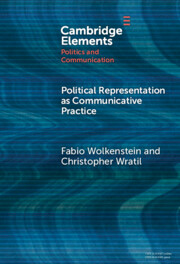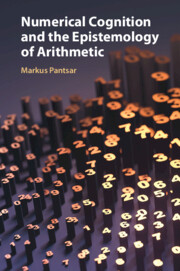148 results
Subnational Climate Clubs: An Interactional Approach to Transnational Lawmaking
-
- Journal:
- Transnational Environmental Law , First View
- Published online by Cambridge University Press:
- 10 March 2025, pp. 1-30
-
- Article
-
- You have access
- Open access
- HTML
- Export citation

Political Representation as Communicative Practice
-
- Published online:
- 24 February 2025
- Print publication:
- 27 March 2025
-
- Element
- Export citation
4 - Constructivism, International Organizations, and Peaceful Change
- from Part II - Theory
-
-
- Book:
- International Organizations and Peaceful Change in World Politics
- Published online:
- 30 January 2025
- Print publication:
- 06 February 2025, pp 78-101
-
- Chapter
- Export citation
8 - Leveling Peace
- from Part III - Practice
-
-
- Book:
- International Organizations and Peaceful Change in World Politics
- Published online:
- 30 January 2025
- Print publication:
- 06 February 2025, pp 181-203
-
- Chapter
- Export citation
Chapter 3 - Constructivist Paradigms and Their Relevance for Strategy-as-Practice Research
- from Part I - Ontological and Epistemological Questions
-
-
- Book:
- Cambridge Handbook of Strategy as Practice
- Published online:
- 11 March 2025
- Print publication:
- 23 January 2025, pp 63-79
-
- Chapter
- Export citation
17 - Flipping constructivist pedagogies to enable the equal intensity of depth and breadth in learning
- from Part 3 - Empowering pedagogies: 21st-century skill development and 22nd-century futures thinking
-
-
- Book:
- Teaching to Transform Learning
- Published online:
- 25 October 2024
- Print publication:
- 05 December 2024, pp 272-287
-
- Chapter
- Export citation
The Pacific Islands and Chinese power as presence, influence, and interference
-
- Journal:
- European Journal of International Security , First View
- Published online by Cambridge University Press:
- 04 November 2024, pp. 1-22
-
- Article
-
- You have access
- Open access
- HTML
- Export citation
What kind of power can citizens exercise beyond the state? Globalizing democracy through representative claim-making
-
- Journal:
- International Theory / Volume 16 / Issue 3 / November 2024
- Published online by Cambridge University Press:
- 08 October 2024, pp. 382-409
-
- Article
-
- You have access
- Open access
- HTML
- Export citation
Limitations of hypocrisy as a strategy of critique in international politics
-
- Journal:
- International Theory / Volume 16 / Issue 3 / November 2024
- Published online by Cambridge University Press:
- 04 October 2024, pp. 295-320
-
- Article
-
- You have access
- Open access
- HTML
- Export citation
Chapter 11 - The Cold War and after
- from Part 2 - International history
-
-
- Book:
- An Introduction to International Relations
- Published online:
- 31 August 2024
- Print publication:
- 12 August 2024, pp 150-165
-
- Chapter
- Export citation
Chapter 7 - Constructivism
- from Part 1 - Theories of International Relations
-
-
- Book:
- An Introduction to International Relations
- Published online:
- 31 August 2024
- Print publication:
- 12 August 2024, pp 95-107
-
- Chapter
- Export citation
1 - Introduction
-
-
- Book:
- Contesting the World
- Published online:
- 01 November 2024
- Print publication:
- 06 June 2024, pp 1-26
-
- Chapter
- Export citation
15 - Social in Practice, Contested in Principle
- from Part IV - Dimensions of Norm Contestation
-
-
- Book:
- Contesting the World
- Published online:
- 01 November 2024
- Print publication:
- 06 June 2024, pp 252-274
-
- Chapter
- Export citation
10 - The Interaction of Law and Politics in Norm Implementation
- from Part III - Meta-theorising, Linkages, and International Law
-
-
- Book:
- Contesting the World
- Published online:
- 01 November 2024
- Print publication:
- 06 June 2024, pp 164-181
-
- Chapter
- Export citation
2 - Theory, Methods, and International Organizations
-
- Book:
- International Organizations
- Published online:
- 17 May 2024
- Print publication:
- 06 June 2024, pp 17-43
-
- Chapter
- Export citation
Chapter 9 - Ontological Considerations
- from Part III - Epistemology and Ontology
-
- Book:
- Numerical Cognition and the Epistemology of Arithmetic
- Published online:
- 15 March 2024
- Print publication:
- 28 March 2024, pp 200-217
-
- Chapter
- Export citation

Numerical Cognition and the Epistemology of Arithmetic
-
- Published online:
- 15 March 2024
- Print publication:
- 28 March 2024
Chapter 4 - Learning theories linking to early childhood science education
- from Part 1 - What initial information should I know to teach science?
-
-
- Book:
- Science in Early Childhood
- Published online:
- 13 December 2023
- Print publication:
- 10 January 2024, pp 54-70
-
- Chapter
- Export citation
4 - The Temporality of IR Theories
-
- Book:
- The Time of Global Politics
- Published online:
- 23 November 2023
- Print publication:
- 07 December 2023, pp 100-142
-
- Chapter
- Export citation
A Reply to Clark Wolf, Elizabeth Edenberg, and Helga Varden
-
- Journal:
- Dialogue: Canadian Philosophical Review / Revue canadienne de philosophie / Volume 62 / Issue 2 / August 2023
- Published online by Cambridge University Press:
- 13 October 2023, pp. 261-277
-
- Article
-
- You have access
- Open access
- HTML
- Export citation


